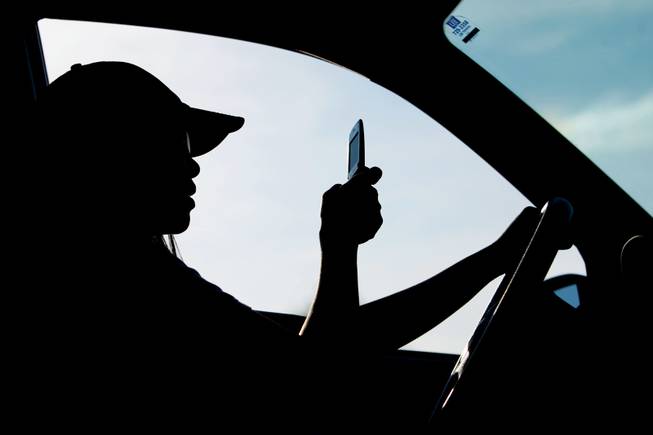
AP
If police officers in Nevada see you on your phone while driving, you can get pulled over.
Saturday, Oct. 1, 2011 | 2 a.m.
Law bans cell phone use while driving
KSNV coverage of the new law banning talking and texting on handheld cell phones while driving, Sept. 30, 2011.
Related story
Guide
Nevada’s new cellphone law, Senate Bill 140, goes into effect today. What we know for certain is this: Until Jan. 1, anyone stopped for talking or texting will be given a verbal warning. After that, fines will be assessed from $50-$250, depending on the frequency of violations.
Given the gray areas in today’s world of wireless communication, we’ve prepared a handy guide to what you can — and cannot — get away with and still stay connected.
What if I’m using my phone as a GPS?
State Sen. Shirley Breeden, the author of SB140, says the goal is to “keep your hands on the wheel.” If you program the location before you begin driving, that’s fine. But if you’re in motion and need to pick up your phone to program information, “then you can’t do that.”
Having a stand-alone GPS is different, Breeden says, as that is not in your hand, distracting you from the road.
What if I’m listening to music on my phone and need to skip a song or just turn it off?
Again, Breeden says if the device needs to be in your hand as part of any function, it falls under the law and is not allowed.
What if I’m using my cellphone on speaker?
Chuck Calloway, director of intergovernmental services for Metro Police, says if you’re just reaching over to turn the phone on and off, then it is allowed under the law, much like you’d operate a Bluetooth phone, the radio or air-conditioning.
What if I get an important call and pull over before I answer the call?
Breeden says pulling over is OK as long as you’re not putting anyone in danger. Pulling over on a residential street is fine. Pulling over on the I-15 — not so much. And no, you don’t have to turn your car off. Just don’t be in motion.
What about iPads, iPods and laptops?
Nice try, Breeden says, but SB140 includes “cellphones, personal digital assistants, pagers or digital devices.”
Bottom line, if you’re looking at anything electronic that takes your eyes off the road and your hands off the wheel, you’re playing with fire.
If I’m stopped at a really long light, can I text someone?
“It’s taking your eyes off the road,” Breeden says. And isn’t it Murphy’s Law that the second you start texting, the light will turn green?
If the cops can’t see the phone, how will they know I’m texting?
Calloway admits this is a tricky area for officers, who have to “visibly see people talking or texting” to pull them over. But veering while texting or the glow of a display on your face at night both would provide probable cause. Upon seeing the device in your lap, officers can make the determination you were using it while driving.
What if I’m just holding the phone while driving?
Officers are told to assume you’re using your phone if you’re holding it. So being absent-minded could cost you.
If an officer thinks I’ve been using my phone, can he grab it to check?
A big no, Calloway says — that whole constitutional rights thing.
While phone records are often checked by law enforcement, it takes a court order or subpoena to do so, so you’re likely safe from close inspection should you appeal a ticket.
What about CB users?
Calloway says ham radio operators are likely safe under the law.
“We have no statistics showing they’re causing accidents,” he says, adding, “I travel the freeway every day, and I see thousands of people talking on cellphones. I don’t think I’ve ever seen anyone talking on a ham radio.”
A version of this story first appeared in Las Vegas Weekly.

Join the Discussion:
Check this out for a full explanation of our conversion to the LiveFyre commenting system and instructions on how to sign up for an account.
Full comments policy